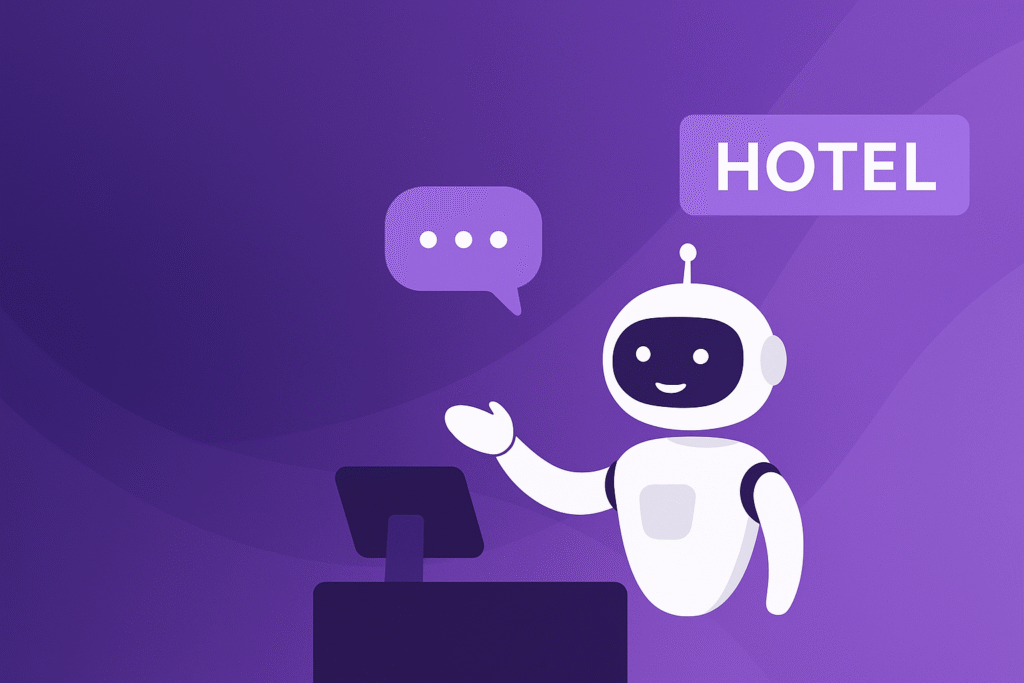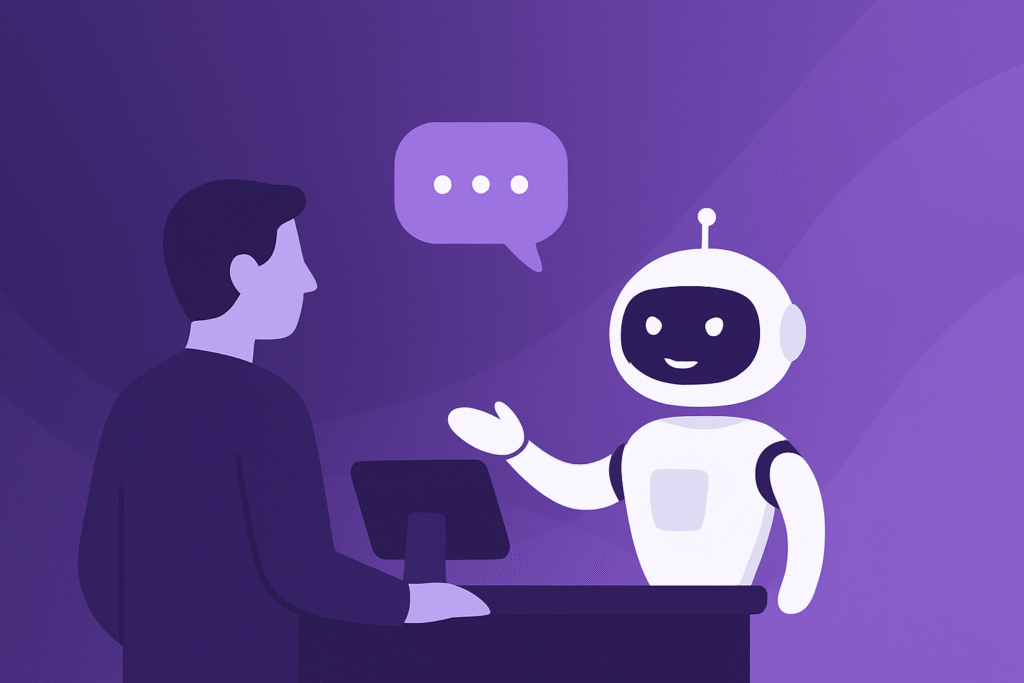Why AI Is Becoming Hospitality’s Secret Ingredient
Walk into a hotel lobby today, and the chances are high that your first interaction won’t be with a receptionist it’ll be with an AI-powered chatbot or check-in kiosk. The hospitality industry, one of the most human-centered sectors in the world, is undergoing a quiet revolution powered by artificial intelligence (AI).
In this article, we’ll cut through the hype and explore how AI is actually being used in hospitality: the benefits, the pitfalls, the lessons learned from both successful and failed implementations, and where things are headed in the next five years.

Executive Summary
- AI is streamlining hotel operations, reducing costs by up to 30% ([McKinsey, 2024]).
- Guest satisfaction scores have improved by 20–40% in hotels that adopted personalization engines ([Forbes, 2023]).
- But AI isn’t a magic bullet several big players have burned millions on poorly integrated systems.
- The winners are hotels that balance automation with human empathy, using AI to handle repetitive tasks while staff focus on personalized experiences.
The Current State of AI in Hospitality
The hospitality industry has always been labor-intensive. Rising wages, staffing shortages, and increasingly demanding guests have pushed hotels and resorts to explore automation. AI has stepped in to fill gaps across:
- Guest communication (chatbots, voice assistants)
- Revenue management (dynamic pricing, demand forecasting)
- Operations (housekeeping optimization, maintenance alerts)
- Personalization (recommendations, upselling)
But adoption rates vary. According to Deloitte’s 2024 survey, only 37% of mid-sized hotels use AI at scale, compared to 68% of large chains.
Benefits of AI in Hospitality
1. Cost Reduction Without Sacrificing Quality
AI doesn’t just reduce headcount it reallocates labor. For example, Marriott’s chatbot now handles 65% of routine guest queries, freeing staff to focus on upselling and guest experience.
2. 24/7 Availability
Unlike human teams, AI doesn’t sleep. Guests checking in at midnight expect instant answers. An AI assistant fills that gap without incurring overtime costs.
3. Personalization at Scale
AI analyzes guest data from booking history to on-property behavior to tailor offers. Example: Hilton’s AI upselling engine increased spa bookings by 23% in 2023.
4. Operational Efficiency
Housekeeping schedules, maintenance checks, and inventory management are being automated. One Dubai-based hotel reported saving $1.2M annually by implementing predictive maintenance.
Case Studies: Successes and Failures
Success 1: Hilton’s AI-Powered Upselling
Hilton deployed a recommendation engine that suggested upgrades and add-ons during booking. ROI: 23% increase in ancillary revenue within 6 months.
Success 2: Marriott’s Chatbot Strategy
By handling two-thirds of FAQs, Marriott saved $10M annually in support costs and reported a 12% jump in guest satisfaction.
Success 3: CitizenM’s Smart Rooms
CitizenM hotels use AI-driven mood lighting, temperature control, and voice assistants. Guest surveys showed 89% satisfaction rates, especially among Gen Z travelers.
Success 4: Purple Square AI’s Hospitality Chatbot
A mid-sized U.S. hotel chain integrated Purple Square AI’s chatbot and automation platform across its 5 properties. Within the first 6 months:
- 70% of guest queries were automated
- Response times dropped from 12 minutes to under 30 seconds
- Direct bookings grew by 18% due to real-time upselling
The chain reported $280,000 annual revenue lift, proving that tailored AI automation can deliver strong ROI even outside of luxury brands.
Failure 1: A Luxury Chain’s Over-Automation
A high-end Asian hotel replaced most front-desk staff with kiosks and bots. Guests complained about “cold” service, and TripAdvisor reviews tanked. Within a year, they reintroduced human concierges.
Failure 2: The Lost-in-Translation Chatbot
A European resort launched an AI assistant without multilingual support. Non-English guests faced errors, resulting in 300+ negative reviews in 90 days.
Failure 3: The Expensive Integration That Never Paid Off
A Caribbean resort invested $2M in AI housekeeping optimization, but without proper staff training, adoption never took off. ROI was negative, and the system was scrapped in 18 months.
Lesson learned: AI is only as good as its integration with human workflows.

Key Use Cases of AI in Hospitality
AI Chatbots for Guest Service
- Answer FAQs instantly
- Handle booking changes
- Upsell add-ons (late checkout, spa, dining)
Spotlight: Purple Square AI – Unlike generic chatbots, Purple Square AI is built specifically for hospitality. It combines 24/7 guest messaging, upselling automation, and multilingual support into one platform. Hotels use it to cut response times, increase direct bookings, and boost guest satisfaction all while keeping operations lean.
Revenue Management Systems (RMS)
- Dynamic pricing models
- Demand forecasting
- Competitor rate analysis
Predictive Maintenance
- IoT sensors + AI detect failing equipment before breakdowns
- Example: Wynn Las Vegas saved $450K annually on HVAC maintenance
Personalization Engines
- Tailored offers via booking engines
- Curated activity recommendations
- Custom loyalty program rewards
Fraud Detection & Security
- AI monitors booking/payment anomalies
- Reduces chargeback fraud by up to 35%
Honest Tool Comparisons (2025 Pricing)
| Tool / Vendor | Core Feature | Pricing (2025) | Pros | Cons |
|---|---|---|---|---|
| Purple Square AI | AI hotel chatbot & hospitality automation | Custom pricing | All-in-one automation, chatbot + upselling, multilingual, PMS integrations, strong personalization | Requires consultation for tailored pricing |
| HiJiffy | AI hotel chatbot | From $450/month | Multilingual, integrates with PMS | Limited customization |
| Asksuite | Guest messaging automation | From $400/month | WhatsApp/Instagram support | Less strong in upselling |
| Revinate | CRM + personalization | From $600/month | Excellent email automation | Higher learning curve |
| IDeaS RMS | Revenue management system | From $1,500/month | Accurate forecasting | Costly for small hotels |
| ChatGPT API | Custom AI integrations | From $0.002/1K tokens | Flexible, scalable | Needs dev team |
Note: Pricing checked September 2025
ROI Example: Is AI Worth It for Hotels?
Let’s say a 200-room hotel installs an AI chatbot + upselling engine.
Cost: $1,000/month ($12,000 annually)
Revenue gains:
- Saved 1 FTE staff = $35,000 annually
- Upselling adds +$50,000 annually
Net ROI: $73,000 – $12,000 = $61,000 positive ROI in year 1
That’s over 5x return in the first year alone.
Contrarian Take: AI Won’t Replace Human Hospitality
It’s tempting to believe hotels can cut 50% of staff and let AI handle everything. The failures above show why that’s wrong. Hospitality is about emotion, trust, and empathy things machines can’t replicate.
The winning strategy is hybrid hospitality:
- Let AI handle repetitive, low-value tasks.
- Let humans focus on high-value interactions (complaints, VIP service, emotional touchpoints).
Hotels that go “all-in automation” risk alienating the very guests they’re trying to impress.
People Also Ask: FAQs
How is AI used in the hospitality industry?
AI powers chatbots, revenue management, personalization, and predictive maintenance. Tools like Purple Square AI help hotels automate guest communication, upselling, and service requests 24/7.
What are the benefits of AI in hotels?
AI reduces costs, boosts guest satisfaction, increases revenue, and ensures 24/7 availability. Solutions such as Purple Square AI also improve upselling and booking conversions.
Will AI replace hotel staff?
No. AI will automate repetitive tasks, but human staff remain essential for emotional and complex service.
What are examples of AI tools for hospitality?
Purple Square AI, HiJiffy, Asksuite, Revinate, IDeaS RMS, and custom GPT integrations.
How does AI improve guest satisfaction?
It delivers faster responses, tailored offers, and smoother check-in/check-out processes. With platforms like Purple Square AI, hotels can provide multilingual, personalized support at scale.
Is AI too expensive for small hotels?
No. Entry-level chatbots start at $400–500/month, with positive ROI if used correctly. Purple Square AI offers flexible pricing tailored to hotel size and needs.
What are the risks of using AI in hotels?
Risks include poor integration, lack of multilingual support, guest pushback, and data privacy concerns.
Which hotels use AI successfully?
Hilton, Marriott, CitizenM, Wynn Las Vegas, and mid-sized U.S. hotel chains using Purple Square AI.
Conclusion: The Future of AI in Hospitality
The hospitality industry stands at a crossroads. AI is no longer a “nice-to-have” it’s a competitive necessity. But the hotels that win won’t be the ones that automate everything. They’ll be the ones that use AI to empower their staff, enrich guest experiences, and deliver memorable stays at scale.
If you’re exploring AI for your hotel, start small test a chatbot, a revenue system, or predictive maintenance. Measure ROI, train your staff, and expand gradually.
Hotels looking for an all-in-one solution can start with Purple Square AI, a hospitality-focused AI automation platform that combines chatbots, upselling, and guest engagement tools.
Book a Free Demo of Purple Square AI today and see how you can cut costs, boost bookings, and delight your guests.